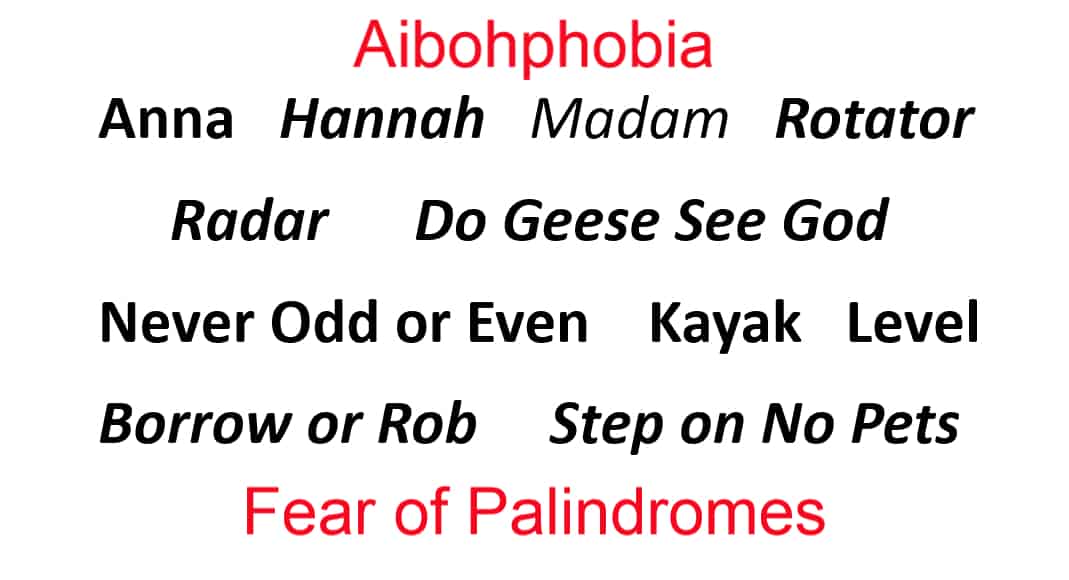Share This Article
Fear of Palindromes: An Ultra-Rare Phobia
Are you afraid of words that read the same forward and backward? When you read or hear words like yay, nun, bib, madam, racecar, or civic, do they put you in a state of panic? Do you want these words permanently deleted from the dictionary?
Or are palindromes more a bewilderment or perplexity versus a fear?
Do they turn to obsessions, cause high levels of stress, or entangle your mind?
If so, you may be suffering from aibohphobia, or the fear of palindromes, which are simply words which read the same way forward or backward.
This palindrome fear is often difficult to explain given how unusual it is. And the fear of being laughed at can make it hard to seek help for the phobia.
However, you are not alone. There are many different kinds of phobias, and a large portion of the world population suffers from one form or another, including aibohphobia.
But remember, phobias are treatable. With the right guidance and mindset, you can learn to overcome your fear and lead a normal and happy life.

Aibohphobia Meaning
Aibohphobia is another term for the irrational fear of palindromes. To understand the fear of palindromes, you must first understand what a palindrome is. As mentioned above, a palindrome is a word that is read the same backward as well as forward. Some common palindromes are: eye, poop, level, mom, noon, refer, pop, and peep.
The hilarious — or must we say terrifying — part of the name of this phobia is that it is deliberately constructed to be a palindrome. The word phobia is reversed to form a prefix to the same word, phobia. So, aibohp is added to phobia to create aibohphobia.
Just like most other specific phobias, the fear of palindrome is an irrational fear that doesn’t hold any true danger to the sufferer.
It’s also important to note that many psychologists doubt the existence of this fear. This is because while some words are easily recognizable as palindromes, most are not.
For example, the phrase “rise to vote sir” is a palindrome. But to fear the phrase, a person needs to first recognize it as a palindrome. Quickly identifying one would require high intelligence and sharp eyes.
Linguists along with psychologists agree that the structuring of the name of the phobia was done intentionally to convey that the phobia doesn’t really exist. This is also why you won’t find this phobia on the official diagnosable list of phobias.
However, there is still a chance that a person may be suffering from the phobia considering how many weird phobias exist. And as phobias can become troublesome when they start interfering with a person’s daily life, so can aibohphobia. Aibohphobia may prevent one from going out, reading newspapers or books, or even looking at a bill or receipt in fear of spotting a palindrome.
Potential Aibohphobia Causes
Like all other phobias, the exact cause of aibohphobia is unknown. However specific phobias generally result from environmental and genetic factors that work separately or in combination.
For example, you may have had a teacher or friend named Hannah who was mean to you during your childhood. As you matured, you learned to associate her name with evil and began to fear it. Or perhaps it was a childhood story you read in which an evil witch named Elle scared you. Such seemingly innocent experiences can have a lasting impact.
A history of mental illness or living with someone who suffers from a mental issue are also contributing factors to people developing phobias.
A Few Aibohphobia Symptoms
Once you know what aibohphobia is, it’s important to consider how this phobia manifests. Given how rare this phobia is, its exact symptoms are not well defined. However, as it is a specific phobia, it will share similar symptoms as other anxiety disorders.
Physical Symptoms
- Nausea
- Sweating
- Trembling
- Palpitations
- Headache
- Fainting
- Dizziness
- Rise in blood pressure
- Dry mouth
Psychological Symptoms
- Anxiety
- Panic attacks
- Irritability
- Mood swings
- Feeling sad or hopeless
- Withdrawing from others
- Feeling of dread
- Feeling of dying
Aibohphobia Treatment
The first step toward treatment for any phobia, including aibohphobia, is rationalizing your thoughts and learning to see the fear as irrational. Listed below are some common methods used to treat aibohphobia.
Self-Help
Self-help allows you to heal at your own pace. While professional treatment is important, you know yourself better than any therapist and are in a better position to determine what techniques can help you.
Here are a few things that you can do to replace irrational thoughts with rational ones and overcome your fear of palindromes:
- Journaling
- Yoga
- Meditation
- Exercise
- Deep breathing
- Exposure therapy
- Relaxation techniques
These techniques calm your mind, help organize your thought patterns, and make way for a better perspective. However, if you feel that your symptoms are not alleviated and the situation is worsening, you can always reach out to professionals.
Professional Help
Getting help from a skilled and licensed therapist is ideally the best way to deal with phobias. Professionals have the knowledge and experience to give you the tools you need to deal with your fear.
While there is no definitive treatment for aibohphobia, treatments that work for other anxiety disorders may also work for the phobia of palindromes.
Some of the treatments your therapist may use either by itself or in combination are:
- Cognitive behavioral therapy (CBT)
- Mindfulness-based stress reduction (MBSR)
- Dialectical behavior therapy (DBT)
- Exposure therapy
Medication
In rare cases, when the phobia has worsened to a point the patient is suffering from repeated panic attacks, the doctor may prescribe antidepressants or beta blockers to help stabilize the patient.
The doctor may use medication with or without therapy and will taper the dosage as soon as they see fit.
Learning to Cope with Aibohphobia
Aibohphobia can severely affect your daily life, restricting you to your home and isolating you from family and friends. However, there are ways to deal with his irrational fear and eventually overcome it.
Apart from seeking professional help, you can talk with family and friends and let them help you work through your fear. Having a close support system is often helpful in one’s journey to overcome phobias.
Additionally, there are many online support groups for people currently suffering from or who have recovered from different types of phobias. Talking to these people will also help you get a better understanding of phobias and even inspire you to battle your own demons.
Conclusion
Suffering from any phobia is difficult. However, you can always reach out to your family or professionals and embark on a journey to recovery from aibohphobia. With some time and patience, you may one day find yourself chuckling at palindromes!




